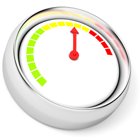The Physical Effects of Stress
The physical effects of stress or a stressful period will vary in strength. If you feel a little stressed out one day a work, you might not feel any later effects.
When our body deals with stress physically, it does so in in different stages depending on the length of the stressor. The model was developed by Hans Selye.
Stress Alarm
The first of the physical effects of stress in your body comes when stress triggers the alarm stage. This is the point where you prepare of fight or flight... Or at least that's what it thinks is going on!The first chemicals are being released in your brain, causing your heart to start racing, your blood pressure to increase and you "feel everything more intensely".
Remember that this is a normal (sometimes lifesaving) mechanism that we all need and experience.
Resistance to the Stressor
The second of the physical effects of stress: In the long run your body will try and resist the stress.Your body tries to endure the constant stressor by producing smaller amounts of the chemicals and hormones that caused the first response - it is easy to see how this in the long run can be harmful...
It is in the stage that you can reduce your stress.
The Exhaustion
Stress Tip
Effects may first show when you take some time off - like a vacation
In this stage you need stress relief. In worst cases, you may also need to see a doctor!
What Are The Physical Effects Doing to My Body?
What I talked about above, are what you can feel when you are stressed. What happens in your body, is a bit more complex.In the initial stage, your brain is trying to help itself so to speak, by making you more alert to dangers. This is for you to make the right decision (the fight-or-flight response) in the moment.
The various chemicals and hormones raises your
- Temperature (your body heats up)
- Blood pressure (your heart pumps harder)
- Heart rate (your heart pumps faster)
- Perspiration (you sweat more)
Common effects are:
- Headache or migraine
- Digestive problems (hormones also slow down stomach acid and can give you stomach cramps)
- Stress Chest Pain (for more info see Stress Chest Pain)
- Compromised immune system
- Trouble breathing (shallow and fast breathing)
- Nausea
Note that if you only now and the feel exhausted or over-burdened, you can often resolve you problem by using the stress reliving techniques. But if you are scared or remember any of the above effects from your own daily life - I ask you to see you doctor.
Otherwise remember: That you have to observe the stressor in your life, recognize that you are stressed and realize that you don't have to be stressed ;)
Physical Effects Recap
| Physical effects... | ...leading to... | ...and leading to |
|---|---|---|
| Stress response in the three stages | (amongst other things) temperature, heart rate, blood pressure and perspiration | Headache, digestive problems, chest pain, breathing trouble and nausea |
Your stress response is your own - stress is a lot more than just the physical effect. You may or may not experience these effects!
What Should I Look Out For?
If you want to know more about stress and how it affects your life, se the psychological effects of stress or learn more about the physical effects of stress and the signs of stress.

